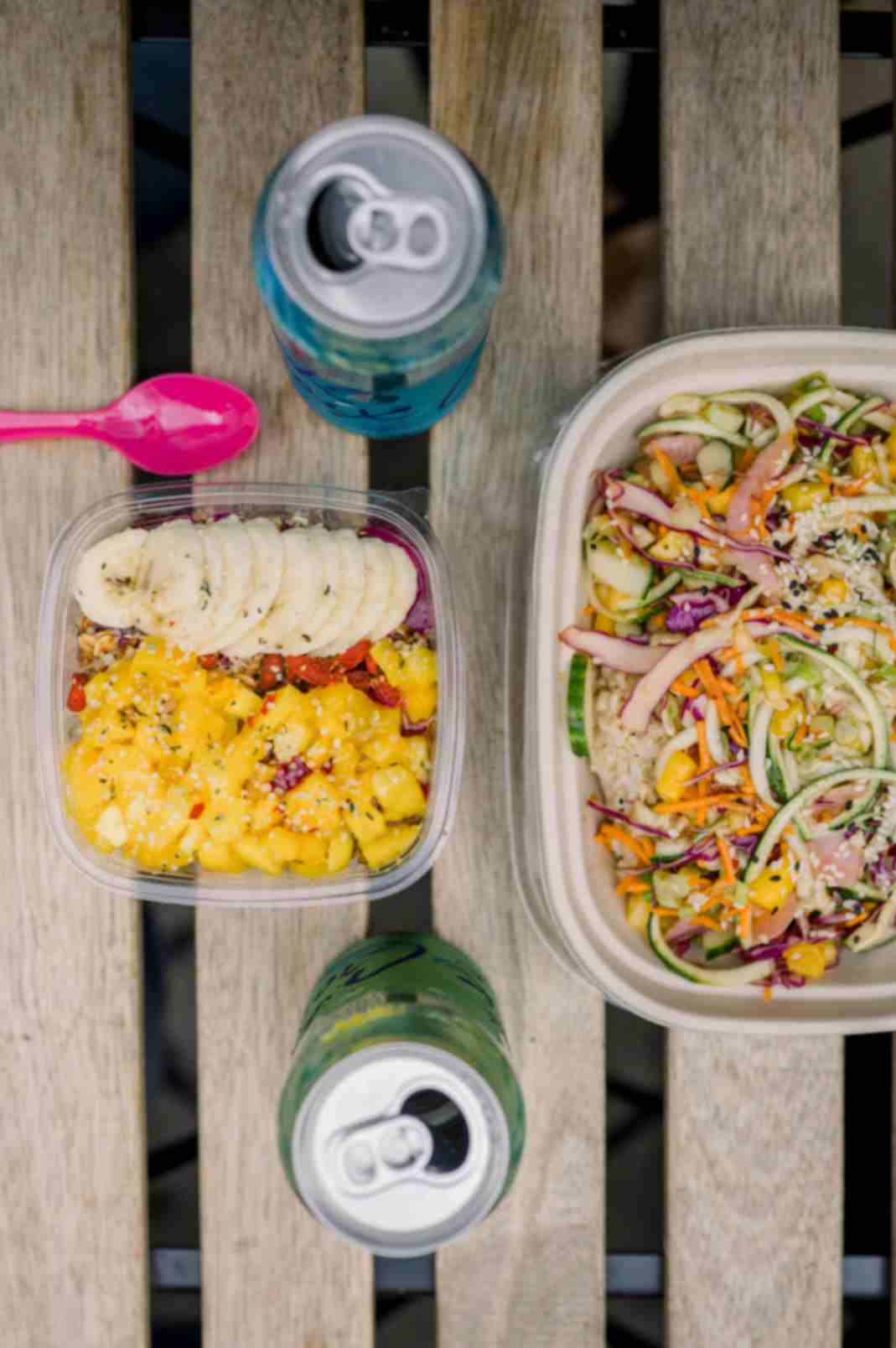How Carbs Affect Stress and Anxiety Levels (Plus What to Eat to Keep Calm)

Are you scared to eat carbs? With the popularity of low-carb and keto diets, more people feel completely confused and maybe even guilty about eating carbohydrates. While these types of no-or-low-carb diets may be helpful for some chronic diseases like epilepsy, they are not beneficial for everyone and can even be harmful. In part, this is because poor nutrition and anxiety are closely linked. Want to learn about nutrition and the link between carbs and anxiety? Here’s how to embrace a balanced relationship with carbs to help you feel less stressed—and unlock the right diet to keep your mind and mood feeling balanced.
- Chronic stress can trigger hormonal responses that lead to obesity and anxiety symptoms.
- Complex carbohydrates help maintain steady blood sugar levels, reducing stress responses.
- Pairing refined carbs with proteins or fats minimizes blood sugar spikes and improves mood.
- A balanced diet and mindful eating can significantly impact anxiety and overall mental health.
How Stress and Anxiety and Impact Your Health
How Stress Occurs in the Brain
How does stress impact your health? First, let’s start with a basic understanding of the body’s stress response. The stress response is made up of a complex group of hormones and neurotransmitters that are controlled by the hypothalamic–pituitary–adrenal (HPA) axis in your brain. The HPA axis connects the nervous and endocrine systems to regulate stress hormone production. Acute stressors—like running from a life-threatening situation—and chronic stressors—like worry about work and fear about the future—both activate the HPA axis. This triggers the release of stress hormones and neurotransmitters like norepinephrine (noradrenaline), epinephrine (adrenaline), and cortisol.
How Stress Occurs in the Body
These neurotransmitters and hormones produce physiological changes in the body, commonly known as the fight-or-flight response. During fight-or-flight, our heartbeat, blood pressure, and pulse rate increase to provide more blood to the muscles, brain, and vital organs. Breathing becomes more rapid, and the airways in the lungs open, allowing us to take up as much oxygen as possible to send to our brain and muscles. This is because our body thinks we might need to get ready to run away from danger, or fight off an attacker.
During this time, blood sugar (aka glucose) and fats also flow into the bloodstream to supply energy to our tissues. As a result, our senses become sharper, and we are more alert when the stress response is activated.These physiological changes occur so quickly that we’re often unaware they are even happening. This helps us to respond to danger almost without thinking.
The stress response was adapted to help us survive life-threatening situations, but it can also be activated by chronic, non-life-threatening stressors like sleep deprivation, traffic, a stressful boss, and even Instagram!
Stress, Chronic Disease, and Obesity
The stress response can have some negative consequences on our body. The relationship between stress, chronic disease, and obesity is complex and multifaceted. Chronic stress has been identified as both a potential cause and consequence of obesity, influencing various physiological and behavioral pathways. Chronic stress can cause long-term glucocorticoid (like cortisol) secretion, increasing fat mass, insulin resistance, and the risk of type 2 diabetes.
Stress and Obesity
The relationship between stress and obesity is bidirectional. While stress can lead to obesity, obesity itself can be a chronic stressor due to factors like weight stigma and associated health complications, creating a vicious cycle. Additionally, chronic stress activates the hypothalamic-pituitary-adrenal (HPA) axis, leading to the release of cortisol, which can increase appetite and promote fat accumulation, particularly visceral fat. Stress can also interfere with cognitive processes such as executive function and self-regulation, leading to overeating and preference for high-calorie foods.
Obesity is also associated with chronic low-grade inflammation and oxidative stress, which are exacerbated by stress. Adipose tissue releases pro-inflammatory cytokines and adipokines, contributing to systemic inflammation and metabolic dysregulation. Oxidative stress, resulting from an imbalance between reactive oxygen species (ROS) production and antioxidant defenses, is a critical component in the development of obesity-related diseases.
Stress and Chronic Disease
Chronic stress and obesity are also linked to metabolic syndrome, characterized by obesity, insulin resistance, dyslipidemia, and high blood pressure—all conditions that increase the risk of cardiovascular diseases. Stress-induced changes in metabolism, such as changes in energy intake and expenditure, further contribute to the development of obesity and its complications.

The Link Between Carbs and Anxiety
Glucose, or blood sugar, is the breakdown product of carbohydrates and is also the body’s primary fuel source. The body works really hard to maintain a steady level of glucose in the blood so that we have enough energy.
When our blood sugar gets too low, it triggers the stress response, releasing glucocorticoids. It’s your body’s way of alerting you that you need glucose fast! Instead of waiting for you to eat, the body self-regulates (this is called homeostasis) and mobilizes glucose from the liver and muscles, bringing blood sugar levels back to normal.
Eaten alone, refined carbohydrates and refined sugar can disrupt your blood sugar homeostasis by causing a sharp spike in blood sugar, followed by a plummet in blood sugar. This big drop in blood sugar triggers the stress response and can even result in anxiety symptoms.
Low-carb diets, especially low-carb and low-fat diets, can also trigger the stress response because the body isn’t as efficient at getting energy from protein and fat as it is from getting glucose from carbs. This results in an increase in cortisol and a sensation of anxiety.
The Best Types Of Carbs To Eat For Anxiety And Stress
So, which carbs are good? Which carbs are bad? Labeling foods as good or bad is a slippery slope to disordered eating, so instead, let’s think about optimizing your carb intake for the outcome you want– less anxiety! You can embrace carbohydrates and learn how to use them to support your stress hormones and lower your anxiety level.
First, let’s talk about the best carbs to eat to keep your blood sugar steady. Complex carbohydrates like whole grains take the longest to digest and produce a steady stream of glucose to support a balanced blood sugar level. As you now know, this is one key to managing anxiety because it calms the stress response.
The carbohydrates listed below are optimal for managing this hypoglycemia-initiated stress response (and have plenty of other health benefits, too):
Root Vegetables:
- Beets
- Parsnips
- Turnips
- Rutabaga
Legumes:
- Lentils
- Chickpeas
- Black beans
- Cannellini beans
Whole Grains:
- Quinoa
- Buckwheat
- Black or Wild Rice
- Oats
You may be wondering whether this means that refined carbs like white bread and foods with added sugar like dark chocolate, candies, and cookies are completely off-limits? Nope, you can still enjoy them as part of a balanced diet, but they should make up a smaller portion of the total carbohydrates you consume. It’s especially important to have refined carbs and sweets with other foods, particularly protein and/or healthy fat, to help slow their absorption, minimize their impact on your stress hormones, and improve your mood overall. So try pairing your toast with nut butter or avocado to prevent that blood sugar spike.
How Many Carbs Should You Eat?
This depends on the person, and factors like age, health, and physical activity level can greatly impact how many carbohydrates an individual should eat. Generally speaking – roughly 45-65% of your total calories should come from carbohydrates, and most of those should be complex, like the ones listed above! You don’t have to count calories or track macros to find the right amount of carbs for your body. You can simply hit these goals by increasing your intake of nutrient-dense carbs.
Other Foods That Help You Keep Calm
While there is substantial evidence supporting the role of nutrition in managing anxiety, the findings are mixed and often limited by the type of study designs and populations. For example, there has been significant evidence that eating a Mediterranean diet, characterized by high consumption of fruits, vegetables, nuts, and legumes, is associated with a reduced risk of anxiety.
Foods that help you keep calm include:
- Magnesium-Rich Foods: Leafy greens, nuts, and seeds can help reduce anxiety.
- Omega-3 Fatty Acids: Fatty fish, flaxseeds, and walnuts are beneficial for brain health.
- Tryptophan-Rich Foods: Turkey, eggs, and cheese promote serotonin production.
- Probiotic Foods: Yogurt, kefir, and fermented foods all support gut health and, in turn, mental health.
- Nutrients zinc and selenium have also been associated with reduced anxiety symptoms.
Foods to Avoid for Better Mental Health
Just like there are foods to add into your diet to support your mental health, there are foods you should avoid, or use sparingly. The following foods and eating patterns have been linked to higher anxiety levels.
- High-fat diets
- Inadequate tryptophan intake
- High-sugar diets
- Caffeine-rich diets
Practical Tips for Managing Anxiety Through Nutrition
In addition to what you’re eating, there are a few other steps you can take to make sure you’re supporting your mental health through nutrition:
- Eat balanced meals. Such as pairing your carbs with a healthy fat or protein, or making sure you have complex carbs alongside your veggies and protein, eating meals that satisfy your nutritional needs will go a long way in balancing your blood sugar and avoiding cortisol spikes.
- Stick to a regular eating schedule. Eating to maintain your energy levels and blood sugar—rather than waiting until you’re starving and hangry—will help support your mood and balanced blood sugar.
- Eat mindfully. Pay attention to how what you eat makes you feel. Sit down, minimize distractions, and eat slowly. Let your brain and body know it’s okay to rest and enjoy—there’s no need for stress here. Eating slowly and mindfully will reduce your cortisol response.
- Stay hydrated. Water makes up 75% of our brain tissue. When you get dehydrated, even slightly, cortisol spikes, and we struggle to get the chemicals required to produce serotonin in the brain. Drink water, stay happy.
The Bottom Line
Growing evidence shows a link between nutrition and anxiety. If you have anxiety or experience chronic stress, you may find that balancing your blood sugar with complex carbs can bring some relief. Reaching out to a mental health professional is also a great idea and something we always support here at Culina Health.
Have more questions about carbohydrates and stress? At Culina Health, we provide personalized nutrition care with a Registered Dietitian Nutritionist that’s covered by insurance. Get started today.
Any general advice posted on our blog, website, or application is intended for reference and educational purposes only and is not intended to replace or substitute for any professional medical advice, diagnosis, treatment, or other professional advice. If you have specific concerns or a situation arises in which you require medical advice, you should consult with an appropriately qualified and licensed medical services provider.





